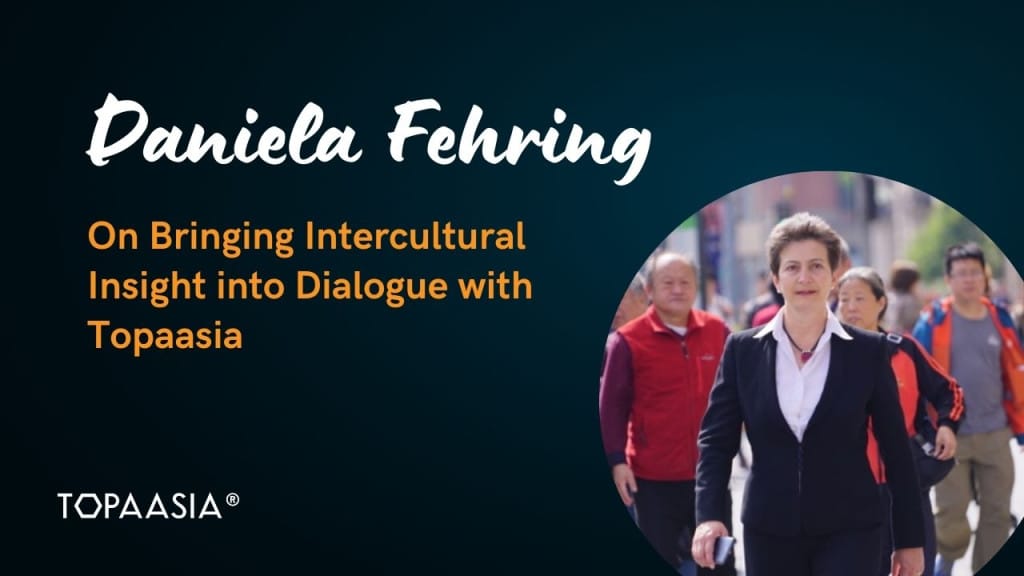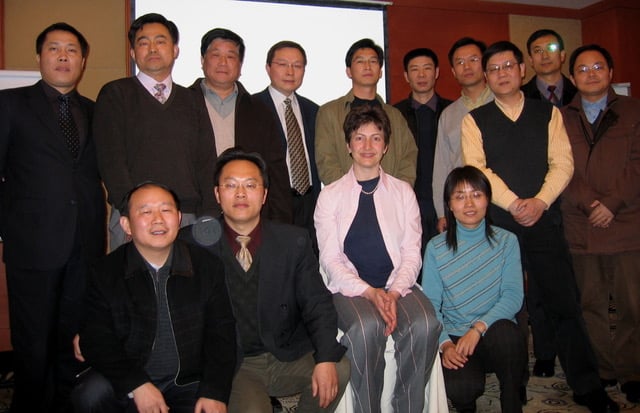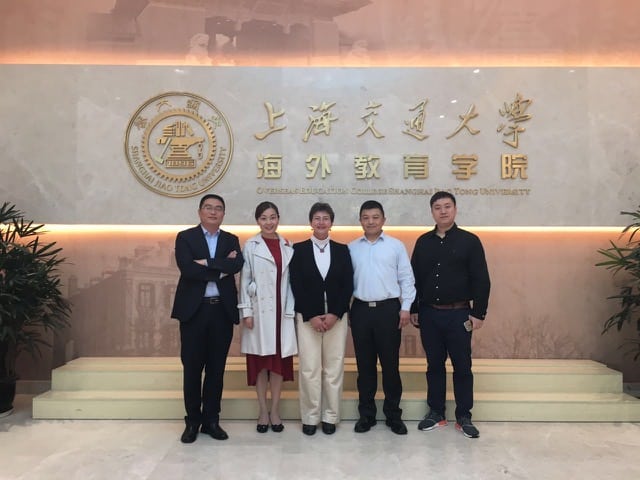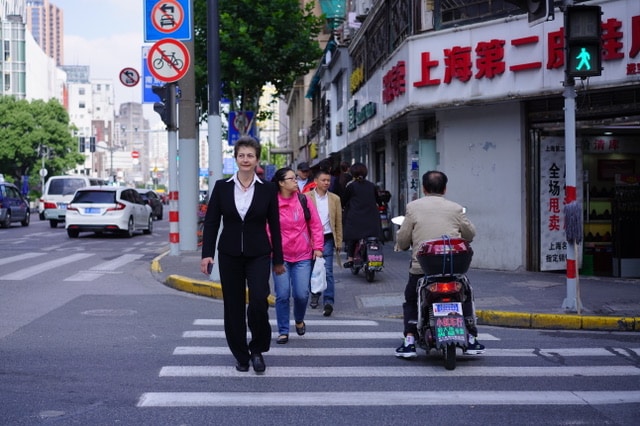
Daniela Fehring – Bringing Intercultural Insight into Dialogue with Topaasia
Daniela Fehring is a seasoned sinologist, facilitator, and consultant whose career has taken her from the lecture halls of Zurich to the boardrooms of multinational corporations. Her deep knowledge of Chinese and German cultures, combined with decades of experience in intercultural collaboration, has now found a new expression through Topaasia — a dialogue-based card game that supports meaningful conversations in teams.
Daniela has created three specialized Topaasia decks – Challenge China, Challenge Germany and Difference Matters.
Each deck is designed to help international teams navigate cultural differences, identify misunderstandings early, and build stronger cooperation. But behind these decks is a personal story of evolution, experimentation, and creativity.
From Sinologist to a Bridge between Cultures
Daniela’s journey began with her studies in Chinese language and world history at the University of Zurich. In the late 1980s, she moved to continue her studies in China and later worked at a Swiss bank in Shanghai. That experience sparked her lifelong commitment to intercultural work.
In 1994 and 1995, I worked in Shanghai, then I moved to Germany in 1996, where I became an independent consultant and trainer.
Daniela’s transition into intercultural consulting took a major leap in 1998, when BASF, one of Germany’s largest chemical companies, approached her to support a high-stakes joint venture project in Nanjing, China. She was tasked with designing and delivering comprehensive preparation programs for employees who would relocate to China — both before and after the new site became operational.
What began as a single project quickly evolved. By 2008, Daniela was regularly working with major German corporations, such as Bosch, Siemens and BMW, offering intercultural training and facilitation both in Germany and China.
The projects always got bigger and more complex,” Daniela reflects. “In the end, I was involved in several merger and acquisition processes — preparing leadership teams for what happens when two very different work cultures have to collaborate. Not just national differences, but organizational mindset differences, too.
This experience gave her a deep understanding of the nuances and tensions that often arise in international business — and eventually, led her to search for more creative, participatory formats like Topaasia to help teams navigate these issues themselves.

Reinventing Dialogue Post-COVID
The COVID-19 pandemic brought international travel to a halt, forcing Daniela to reconsider her approach. She began exploring creative ways to engage global teams without being physically present. This led to a turning point.
In former times, my position was that I have the know-how, and I give it as a trainer or facilitator. But this was also a little bit one-sided — because we are complex beings. So I started an education in existential analysis in Vienna, which gave me deeper insights into what it means to live a fulfilled life.
From this introspection came a desire to step away from being the expert with all the answers, and instead, become a facilitator of meaningful dialogue. That’s when she discovered Topaasia.
I was looking for games and interactions that provide more easiness, and at the same time are serious enough that my German clients can take them. And that’s how I found Topaasia.
Why Topaasia Works in Intercultural Settings
For Daniela, Topaasia offers a powerful way to bring up sensitive topics in a psychologically safe way — especially in cultures where direct confrontation is avoided.
In Asia, when people entered my training facilities, they were always like, ‘Hopefully I’m not the first.’ In Germany, people come in and say, ‘I hate this about this culture.’ But with Chinese or Swiss participants, they say, ‘No, no, we don’t have problems.’ It’s much harder to find the pain points.
Topaasia provides an indirect but effective entry point into those conversations.
The deck allows people to speak through the card — it’s not me saying, ‘I don’t like this.’ It’s the card. That makes it easier, especially for more introverted or shy people to participate.
It’s also highly effective in hybrid or virtual settings, where engagement is often a challenge.
The participants really have to be present. You can’t just do something else, because you have to pick a card and then explain why. This is something I haven’t seen in a lot of other formats.

Three Decks for Three Contexts
Daniela’s three decks offer different levels of cultural focus:
Challenge China
For teams who collaborate with Chinese colleagues, suppliers, or customers, but struggle to understand cultural dynamics. It’s meant to be used by non-Chinese teams to gain perspective and adjust their own approach.
You don’t need to know a lot about Chinese culture to use this. Within an hour, you can identify what is bothering you, what might be a blind spot, and start changing your perspective instead of going into blame mode.
It is not meant to be played together with the Chinese team — that’s where the next deck comes in.
Difference Matters
This deck is designed for mixed, multicultural teams, regardless of nationality, to openly explore differences in working style, communication, expectations, and values.
It’s more about surfacing invisible norms and assumptions — things that feel like a taboo or ‘the only right way’ of doing things. Nationality matters less here than the willingness to reflect.
Challenge Germany
This one flips the script. For non-German teams working with Germans, it helps to unpack the underlying assumptions of German work culture and behavior.
For example, Finns and Germans may think they’re similar, but there are still hidden cultural expectations. Challenge Germany helps to surface those and discuss them constructively.
A Practical and Reflective Tool for Global Teams
Working in international teams inevitably comes with misunderstandings — it’s part of the deal when people from different cultural and organizational backgrounds collaborate. But as Daniela points out, the real challenge isn’t the existence of misunderstandings, it’s how they’re handled.
If you have international teams, you always have misunderstandings. That’s just natural. And if you deal immediately with them, you can prevent blockades or bigger issues or even conflicts.
Unfortunately, many teams avoid addressing tensions early. As small misunderstandings pile up, they can evolve into major problems — ones that are often expensive and time-consuming to resolve. Companies may have to bring in intercultural consultants or country-specific experts, invest a full day or more in analysis, and still struggle to get to the heart of the issue.
Topaasia offers a smarter, more agile way to address these challenges before they escalate.
Daniela highlights that the Topaasia intercultural decks — especially those tailored for international collaboration — allow teams to surface their core frustrations and tensions in just an hour, without needing extensive background knowledge of specific cultures like Germany or China.
You can within an hour really look at what is annoying us. Where is our biggest issue? And why do we get emotional about it or angry or whatever?
This approach flips the traditional model: instead of looking for problems in the “other” side — the Chinese team, the German team, etc. — the game encourages self-reflection and mutual understanding. It helps participants ask:
- What’s really bothering us right now?
- Why is this specific issue triggering a strong reaction?
- What part might we be playing in this challenge?
- What concrete actions can we take?
- What obstacles might prevent those actions from working?
- And how do we communicate effectively with our counterparts?
My customers in former times always looked for a solution over there, and never took into account that they might be a part of the issue… The deck gives you this option to really look at what is annoying us and talk about, okay, what to do about it?
By shifting the conversation from blame to ownership, and from vague frustration to focused action, Topaasia helps teams build trust, increase cultural awareness, and move forward with clarity — without needing a deep dive into culture theory or external consultants every time.
Making Intercultural Dialogue Accessible
With growing interest in and recognition of the importance of DEI initiatives Daniela sees her decks as a cost-effective, scalable alternative to expensive workshops or consultants.
Not all companies have massive budgets for DEI initiatives. This gives them an option that’s not expensive. Once they have the license, they can run these sessions themselves — no need to ask several management levels for permission.
She’s also developing a train-the-trainer model, so that organizations can use the tools independently.
It’s not the fish, it’s the fishing rod. I want to give my clients a method to help themselves.
The Real Challenge: Letting Go of the Expert Role
Perhaps the most fascinating part of Daniela’s journey is how creating the decks transformed her own approach.
Being an expert made it harder at first. I wanted to share all the know-how. But then I realized that the deck can’t work like this. I had to step into the shoes of my clients — what are their issues? What do they want to discuss? That changed everything.

If your organization is working across cultures — whether with China, Germany, or a diverse global team — Daniela’s Topaasia decks offer a structured yet flexible way to turn tension into understanding, and misunderstandings into insight.
Want to explore how these tools could support your team?
Get in touch, and let’s start the dialogue.

